
2030 Sustainability Goals
Because jewelry is a reflection of who you are, we partner with trusted suppliers around the world and use high-quality, responsibly sourced materials to craft pieces designed to last a lifetime.
PEOPLE
An Emboldened Community
We’re holding ourselves accountable to Mejuri’s growth by setting ambitious standards across our operations, ensuring that how we grow reflects our values and drives meaningful impact in the communities we serve.
As part of a globally connected industry, we recognize the opportunity—and responsibility—to extend our influence beyond our business. Mejuri’s social impact and philanthropic efforts are deeply connected. Together with our customers, we champion causes that uplift women and underrepresented communities, creating lasting change through collective action.
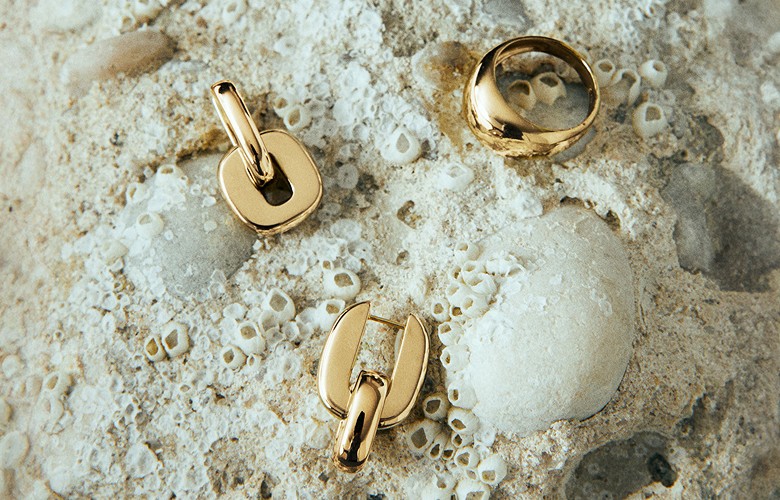
Methodology
- •
Percentage of key vendors and partners committed to Mejuri’s DEIB standards
- •
Percentage of key vendors and partners demonstrating progress against DEIB targets
October 2025 Update
Since we established this goal we’ve been tracking data on our progress with our partners.
At Mejuri we want to ensure that all of the people working for our vendors are in workplaces that are inclusive and equitable.
In the first half of the year 83% of our participating suppliers have acknowledged the program and met with our sourcing teams to discuss their own internal programs. 46% of our suppliers have their own programs and now understand the importance as it relates to their business with Mejuri. We credit our revised supplier onboarding with the increase from the last fiscal year and our strong support from our sourcing teams.
Our supplier diversity has decreased to 4%. The number of diverse jewelry suppliers we work with has stayed the same but we’ve brought in more suppliers which brought the percentage down.
In the second half of the year we intend to work on how DEIB impacts other parts of our business, such as our Brand team. We want to ensure that all parts of our business support diverse people and organizations.
Methodology
- •
Number of Mejuri in-store events
- •
Number of volunteer hours
- •
Number of community members impacted by community philanthropy
October 2025 Update
Since setting our goal to deepen our community impact, we have concentrated on both in-store events and volunteering opportunities that empower Mejuri team members to engage meaningfully with local communities.
- •
Number of Mejuri in-store events: 0
- •
Number of volunteer hours: 185
- •
Number of community members impacted by community philanthropy: 48
Volunteering
In 2025 we’ve been working to expand our corporate volunteerism. This year we planned activities for our fulfillment center and our corporate offices during Give Back Week in September. Teams worked together to meaningfully impact individuals facing economic hardship.
In Toronto we partnered with Shoebox Project who collects and distributes filled shoeboxes containing essentials and personal care items to women experiencing or at risk of homelessness in Toronto.
In NYC we worked with WIN (Women In Need) who provides housing, childcare, job training, financial literacy, and educational programs for homeless women and their children in New York City, with the ultimate goal of helping families achieve self-sufficiency and permanent housing.
Our Toronto team also volunteered at Camp Scugog, a community camp offering outdoor programming for children and families facing socioeconomic barriers. Programs prioritize environmental stewardship and ensure that financial challenges do not prevent participants from accessing the camp’s outdoor and developmental experiences. Teams helped staff with general cleaning and repairs of cabins, docks and the grounds to ensure the camp is ready for the winter and can serve more families next summer.
The teams were able to assemble and donate 48 kits to Shoebox Project in Toronto and WIN (Women In Need) in NYC. Our total volunteer hours for this programming was 185 hours.
Volunteering
In 2024, Mejuri held a company-wide volunteering initiative as part of our annual Give Back Week. Team members in New York and Toronto assembled chemistry and STEAM kits, along with handmade bookmarks, for local nonprofits. These were donated to The Toronto Foundation for Student Success (TFSS) and The Boys and Girls Club of Harlem, ultimately supporting 315 children. In total, our team contributed 92 volunteer hours to these projects.
Inside Design Series
In May, we hosted a special event at our Flatiron store in New York City as part of the Inside Design series by the New Museum. Isolde Brielmaier, Deputy Director of the museum, invited Noura and Patricia Mweene—founder of Design Thinking Africa—to lead a powerful conversation on Mejuri’s partnership with Patricia. During the event, Patricia showcased stunning gemstones cut and polished by women in Zambia, made possible through scholarships funded by Mejuri.
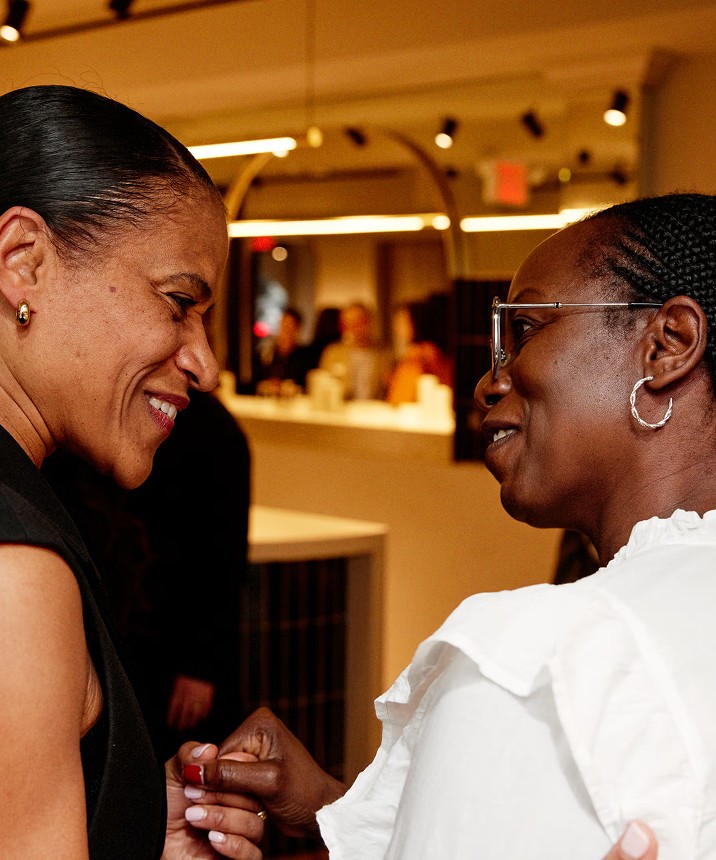
Isolde Brielmaier and Patricia Inonge Zita Mweene | Photo Credits: Zev Starr-Tambor
A Culture of Belonging & Growth
We’re committed to fostering an authentic, connected community—one where every team member contributes to our culture and has opportunities to grow personally and professionally.
We know meaningful change begins with listening. By actively engaging our teams, we ensure every voice is heard and valued. This not only strengthens our culture, but helps us better support our people and evolve in ways that meet their needs.
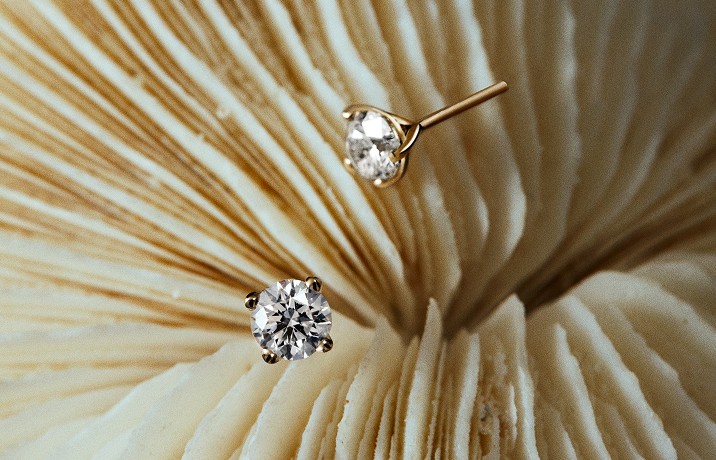
Methodology
- •
Percentage of employees who respond positively to engagement questions in surveys
- •
Percentage of employees who self-report that they feel that Mejuri is an inclusive environment
October 2025 Update
- •
Since introducing our employee survey, we’ve maintained an engagement score of 78%
- •
80% of employees report that they feel Mejuri is an inclusive environment.
Engagement
By creating meaningful opportunities to listen and engage with our team, we’ve gained valuable insights into how we can better support our employees and respond to their evolving needs. As part of this ongoing effort, our People Operations team regularly conducts surveys to identify strengths, uncover areas for growth, and design programs that reflect the needs of our people. We're proud to have maintained an employee engagement score of 78%.
Inclusion
For every team member to feel empowered to help shape our culture, they must first feel heard and valued. Our commitment to a strong listening culture helps us attract and retain the right talent, uphold our shared values, and create an inclusive and supportive employee experience. Today, 80% of employees report that Mejuri is an inclusive environment.
Methodology
- •
Candidate pipeline conversion across all job postings
- •
Candidate net promoter score
- •
Diversity metrics at the executive level (c-suite)
- •
Diversity metrics of all employees
- •
Diversity metrics of all leaders (VP and above)
October 2025 Update
Beyond evaluating and setting benchmarks, we are committed to ensuring that we have the necessary policies and guidance to support this goal. This includes reducing the potential for implicit bias, communicating clear performance standards, and reviewing additional support that may be needed for equity-seeking groups.
Pipeline Conversion
Leveraging data from our survey, we set metrics to measure candidate pipeline conversion across all job postings and tracked candidate net promoter scores to evaluate the impact of our efforts. This has included gathering demographic data in the interview process to understand our pipeline all the way to offer, offering hiring manager training and implementing a scorecard system to deliver an equitable hiring process
Diversity, Leadership
- •
Ethnicity
- •
White: 69.57%
- •
Asian: 8.7%
- •
Black: 4.35%
- •
Middle Eastern: 8.7%
- •
Prefer Not to Answer: 8.7%
- •
Diversity, Global
- •
Ethnicity
- •
White: 27.01%
- •
Asian: 13.81%
- •
Latin/Hispanic: 11.40%
- •
Black: 9.24%
- •
Pacific Islander: 4.68%
- •
Middle Eastern: 3%
- •
Indigenous: 0.96%
- •
Two or more races: 10.92%
- •
Prefer not to answer: 4.8%
- •
Unknown: 14.71%
- •
Methodology
- •
Percentage of employees that received a promotion in the previous year
- •
Annual retention metric
October 2025 Update
- •
15% of employees received a promotion (2024)
- •
46% retention rate (2024)
Professional Growth
We are on track to exceed our internal mobility targets for our Retail teams again this year. We have been able to offer our internal talent opportunities to open new stores as well as grow in their responsibilities in-store. We’ve seen 15.56% of our team (approximately 83 team members as of the end of August) who have been tapped to grow our store footprint and lead our teams.
Part of the success of this program is due to programs enabling store leadership success, and enhanced semi-annual talent and succession planning initiatives.
We launched several new training initiatives this year, including feedback, product knowledge, Six Sigma White Belt training for our fulfilment centre leadership, and a lunch and learn series to continue to foster our team's internal growth and development.
Mentorship
We are in the second year of our High-Potentials Program to help top-performing corporate team members develop career-advancing skills and increase their impact. This year’s program was enhanced with structured goal-setting, mentorship, and coaching services.
Internship
This year marked the launch of our internship program on our design team in New York City. The selected intern was a 2024 recipient of the Mejuri Design Excellence Award and a recent graduate of the Rhode Island School of Design. She completed her internship e with a full-time offer to join our design team–and we’re thrilled to see her creativity and fresh ideas come to life through our jewelry.
Retention
Our corporate retention rate is 46% in 2024. Our retail business benefits from a dynamic workforce of seasonal employees and college students, who bring fresh perspectives and enthusiasm to our team during their time with us; their temporary and transitional roles reflect a vibrant environment where staff pursue diverse goals both at work and beyond.
Recognition
Top performers from all three lines of business were selected as Company Maker Award winners. In celebration, they came together at our head office to receive coaching, engage with company leadership, and build meaningful connections with one another. These relationships are intended to inspire collaboration, strengthen leadership, and foster a deeper sense of connection within their own teams.
Benefits
We enhanced our total rewards program to enable access to information and more inclusive benefits practices. This includes developing compensation & pay equity knowledge resources, as well as making enhancements to dependent benefits plans contribution rates in the United States to better support families, and changing our plan definition of infertility to match the ASRM definition and make family planning more inclusive. We also expanded benefits eligibility to our entire UK team.
PLANET
Climate Positive
We’re going beyond carbon neutrality by investing in carbon removal through restoration and conservation projects in regions where we and our suppliers operate.
Why it matters: As the need to maintain a resilient planet accelerates, reducing emissions isn’t enough. We must also restore ecosystems, protect biodiversity, and adopt regenerative practices. Climate impact is global and interconnected—collaboration across industries is essential to drive meaningful, far-reaching change.
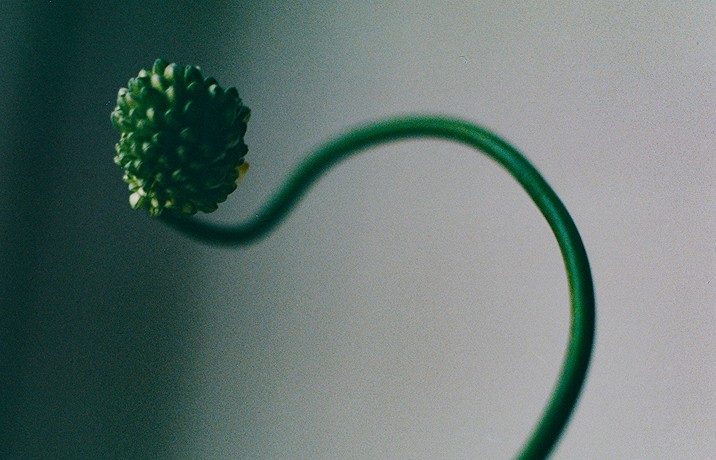
Methodology
- •
Percentage reduction in emissions across Scope 1, 2, and 3
- •
Percentage renewable energy used in our buildings
- •
Greenhouse gas intensity of customer shipments
- •
Percentage of suppliers demonstrating progress against environmental performance goals
- •
Percentage renewable energy used by suppliers
October 2025 Update
Percentage reduction in emissions across Scope 1, 2, and 3
- •
-8% Total
- •
-25% Scope 1+2
- •
-8% Scope 3
- •
Percentage renewable energy used in our buildings
- •
40%
Greenhouse gas intensity of customer shipments
- •
4.2
Percentage of suppliers demonstrating progress against environmental performance goals
- •
43%
Percentage renewable energy used by suppliers
- •
44%
In early 2025, we submitted our target and plan to the Science Based Targets Initiative (SBTi) for validation. SBTi validated our near-term reduction target and plan in February 2025.
By 2030 Mejuri is committing to:
- •
Reducing absolute emissions in Scopes 1 and 2 by 66.5%
- •
Reducing emissions intensity in Scope 3 by 52%
Real Talk: What are science-based targets, and why are they important for companies to set?
Science-based targets give companies a clear, actionable path to cut greenhouse gas emissions in line with limiting global warming to 1.5°C, supporting the Paris Agreement and helping manage climate risks.
Emissions Reductions
In early 2025, Mejuri’s science-based carbon reduction targets for 2030—including a 66.5% absolute reduction in Scopes 1 and 2 and a 52% reduction in Scope 3 intensity by 2030—were validated by the Science Based Targets Initiative (SBTi), reinforcing our climate commitment and alignment with the Paris Agreement. Our plan prioritizes low-carbon materials, renewable energy, traceability, and supplier engagement.
In the first half of 2025, we worked with key suppliers to survey their progress on energy efficiency, renewable adoption, and sustainable material use, ensuring that our supply chain supports our ambitious goals.
This year, we continue to focus on tracking and reducing our total greenhouse gas emissions in line with our validated science-based targets for 2030. After reducing our operational footprint (Scopes 1 and 2) last year by 25%, we are continuing to grow our retail and supplier footprint. We need to continue our emission intensity trajectory relative to revenue to stay on track. Our emissions reduction strategy prioritizes low-carbon materials, advances our 2030 roadmap, and encourages supplier use of renewable energy. We will continue surveying key supply chain partners to assess their climate goals and progress in areas like energy efficiency and sustainable materials. Through these efforts, we intend to strengthen our climate action while enhancing transparency and accountability across our value chain.
Methodology
- •
We will map Mejuri’s impacts on biodiversity and water across sourcing of key raw materials
- •
We will prioritize and develop action plans in areas where we have the most significant biodiversity impact
October 2025 Update
This year, we have built on the foundation laid in 2024 when we developed our first Nature Roadmap based on extensive biodiversity and water risk assessments. These insights continue to guide our efforts toward making a positive impact on biodiversity, aligned with the industry-leading Watch & Jewellery Initiative 2030 Nature Action Playbook. Our focus has included establishing baselines for water use and strengthening pollution mitigation requirements for suppliers. We are proud to continue our restoration efforts through regenerative initiatives like Regeneration and Salmon Gold, which actively restore ecosystems affected by mining.
Looking ahead, we are preparing to set nature-related targets aligned with leading global frameworks). We are carefully considering the implications of our expanding global footprint and potential mitigation strategies. All of this work supports our Climate Positive by 2030 commitment through responsible stewardship of nature and biodiversity.
Emissions Reductions
We are tracking our total greenhouse gas emissions that impact climate, seeking to reduce those emissions by 2030 to the amount set out in our science-based target. We've brought down our operation footprint (scope 1 & 2) by one quarter; our supply chain emissions are up slightly due to growth even if our emissions intensity (emissions per $) has gone down.
We’re cutting emissions by prioritizing low-carbon materials, advancing our reduction roadmap, and encouraging suppliers to use renewable energy. Remaining emissions are addressed with Renewable Energy Credits (RECs) and offsets, purchased proactively using our emissions data.
Renewable Energy represents the portion of all energy powering our offices and stores — including fuels as well as electricity — that is renewable. We use the more stringent definition of renewable that does not include large hydropower. Greenhouse gas intensity of our shipments reflects the emissions required to get our product to customers.
To gather supplier progress we surveyed our key supply chain partners to understand their climate goals and to gauge the extent to which they've made progress through energy efficiency, renewables, sustainable material use and more.
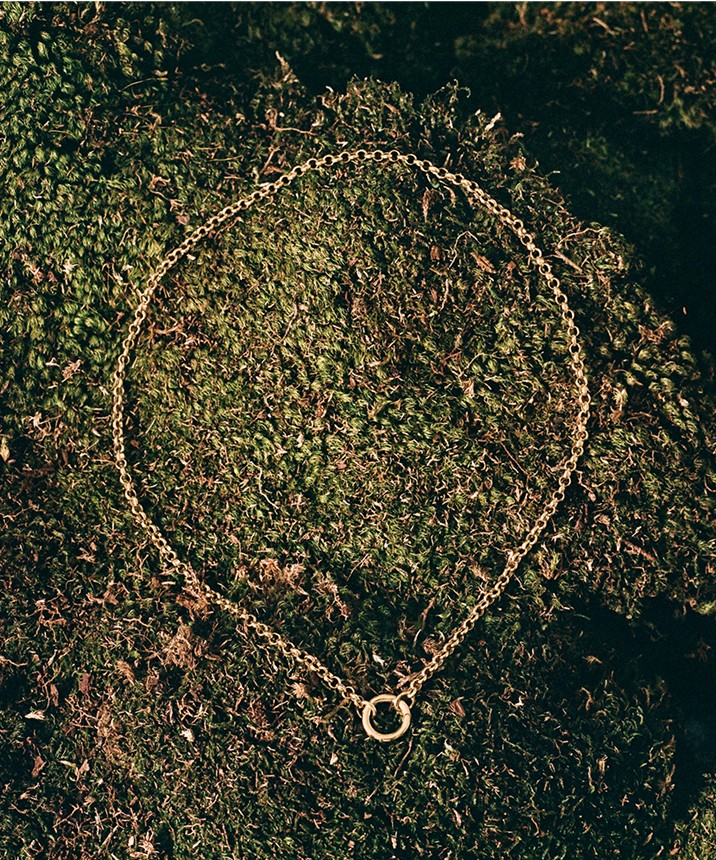
PRODUCT
100% Circularity
We design products and packaging with their full lifecycle in mind, creating circular pathways like repair, resale, and recycling.
Why it matters: Circular design helps preserve resources and is key to our Climate Positive goal. By applying circular principles—reduce, reuse, repurpose, recycle—across product design, packaging, and operations, we’re building a more sustainable business from the ground up.
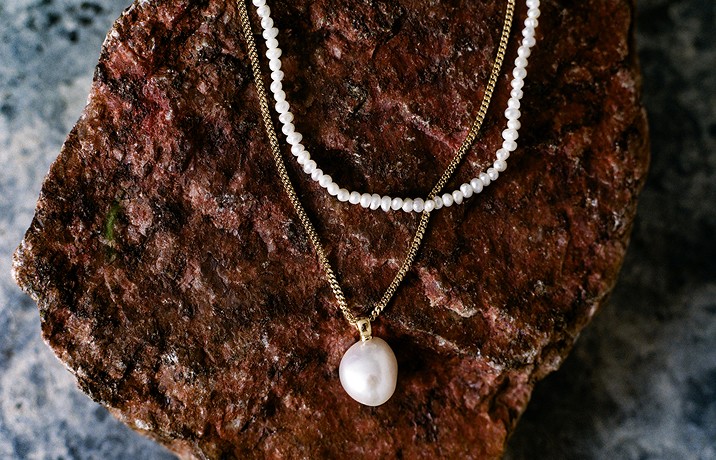
Methodology
- •
Number of units repaired via Mejuri repair programs
October 2025 Update:
Since establishing this goal we’ve worked hard to ensure all products have post-use options.
Recycling Events
Our recent partnership event with Spur Jewelry at our NYC Flatiron store marked a meaningful step toward our 2030 circularity goals. By encouraging customers to give new life to their old gold and platinum through renovation or exchange, we’re helping to close the loop on precious materials.
Through this partnership, Spur offers Mejuri customers a trusted destination to transform gems and precious metals into meaningful, custom designs—perfectly aligned with our commitment to sustainability and responsible sourcing.
Over the course of two days, customers brought their preloved pieces—recycling a significant amount of gold and platinum. They booked appointments to exchange their jewelry for Mejuri credit to shop immediately or Spur credit to redesign sentimental pieces into something entirely new.
Repair Program
We’re currently working to establish a repair program that will roll out in 2025. The program is in the testing phase, with plans to partner with locations across North America (including the U.S., Canada, and Mexico), where customers will be able to send in products for repair.
Methodology
- •
Percentage of products made with recycled content
- •
Percentage of materials derived through regenerative practices
- •
Percentage of packaging materials that are biodegradable or commonly recyclable
October 2025 Update:
Recycled Content
Since establishing this goal, we’ve continued to make meaningful strides in our material sourcing:
- •
94.11% of gold and
- •
94.75% of silver are from recycled sources
To support our circularity goals, we prioritize recycled gold and silver in our jewelry. In 2024, we increased our use of recycled silver by 3%.
Regenerative Materials - Salmon Gold ™:
We are thrilled to launch a second Salmon Gold ™ collection in 2025.
Our partnership with Regeneration ensures we can continue to use 100% traceable gold from restoration and remining projects in North America.
In 2025 we’ve been able to increase the volume of salmon gold purchased for this collection by 31%.
- •
337 troy oz of gold derived through regenerative practices that were made into our Salmon Gold ™ collection
- •
The collection will launch in Fall 2025 and will include earrings and rings.
By continuing to use Salmon Gold™ in our collections, we're not only increasing the traceability of our gold —we're helping rewrite the future of former mine sites and giving rivers (and salmon) a new lease on life, all while connecting our products to our Climate Positive by 2030 ambitions. Revenue from this collection directly funds ongoing habitat restoration efforts across North America.
The gold for the 2025 Salmon Gold ™ collection originated in Sulphur Creek, Yukon, CanadaUhler Creek, Alaska, USAFalls Creek, Alaska, USAMoore Creek, Yukon, Canada
We are thrilled to continue as Founding Partners of Regeneration, bringing materials from regenerative practices directly to our supply chain.
Packaging
To continue to reduce our environmental footprint, we offer a reduced packaging option at checkout. In the first half of 2025, 15% of customers chose reduced packaging. We’re launching redesigned packaging in winter 2025 that uses recycled materials, eliminates plastic, and prioritizes reuse and recyclability and will continue to offer reduced packaging at checkout.
Methodology
- •
Weight of waste diverted from landfill
- •
Year-over-year reduction in waste
October 2025 Update:
Waste reduction is getting a major upgrade.
Poly bags might be the jewelry world’s packaging go-to, but they can’t be recycled in the average recycling bin. That’s why we continue to team up with TerraCycle to avoid using hard-to-recycle plastics—and in just six months, we've diverted 2,131.54 lbs of plastic waste from landfills, contributing to a cumulative 5,883 lbs saved since we kicked things off in 2023.
This year, our recycling efforts expanded to include disposable gloves as well as ink and toner cartridges, with our fulfillment center already logging 284.7 lbs recycled.
As retail grows, so does our recycling program—ensuring we stay one step ahead of waste, no matter how tricky the material may be.
Packaging
To reduce our environmental footprint, we offer a reduced packaging option at checkout. As of 2024, 18% of customers have opted in—and we’re committed to increasing that number. We’re launching redesigned packaging in winter 2025 that uses recycled materials, eliminates plastic, and prioritizes reuse and recyclability.
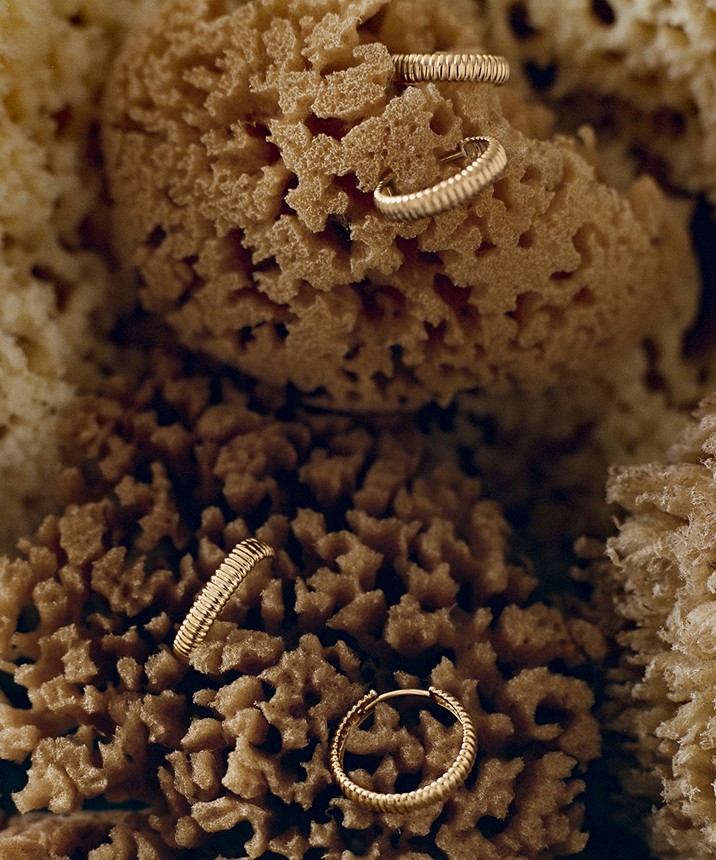
100% Traceability of Precious Materials
We will educate customers about the origins of their responsibly sourced products, from materials to craftsmanship locations.
Why it matters: While each Mejuri piece has a maker’s mark, tracing our jewelry’s full journey goes beyond the finished goods factory. We’re committed to identifying the origins of raw materials, though traceability data may vary by supplier, region, or mine. As we introduce new products and suppliers, our traceability efforts will evolve, underscoring the ongoing, dynamic nature of this work.
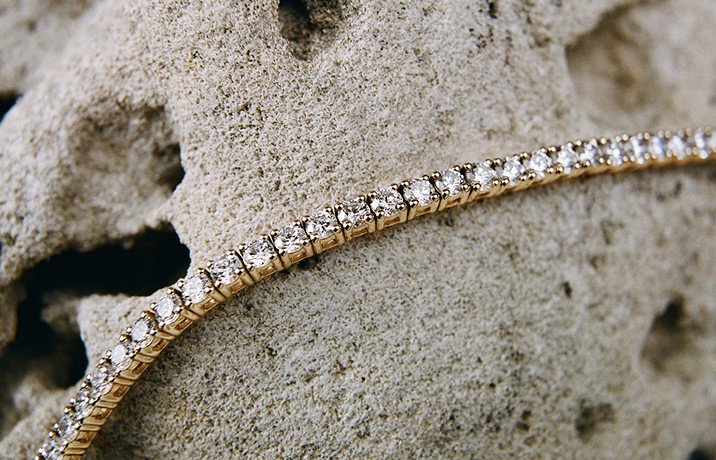
Methodology
- •
Percentage of natural diamonds purchased that are traced to a group of known mines.
- •
Percentage of lab grown diamonds purchased that are traced to the grower.
- •
Percentage of precious colored gemstones purchased that are traced to the region within the country of mining origin.
- •
Percentage of pearls purchased that are traced to the country of farming origin.
- •
Percentage of precious metals purchased that are traced to mine of origin or the recycler.
October 2025 Update
Since establishing this goal, the Mejuri Sourcing team has made significant strides in our traceability.
- •
Natural Diamonds: 6% unknown, 51% traced to country of origin, 43% traced to mine or group of known mines.
- •
Lab Grown Diamonds: 100% traceable to grower
- •
Colored Gemstones: 0% unknown, 22% to country of origin, 78% traced to region within country of origin.
- •
Pearls: 100% traced to country of origin
- •
Precious Metals: 1.5% unknown, 98% traced to country of refiner or recycler, 0.5% traced to known mines.
Traceability
Achieving traceability with finished goods suppliers is a complex process—one that demands strong cross-functional collaboration across our company and supply chain. In the first half of this year we’ve had some big improvements.
- •
14% increase in traceability for natural diamonds
- •
We increased the number of pearl suppliers we work with but were able to maintain full traceability of this material.
- •
Our metals suppliers have all increased the visibility they’ve provided to us helping us ensure continuous improvement.
Since establishing our Traceability goals in 2023, we continue to focus on operationalizing this commitment by refining specifications, developing data collection tools to assess our baseline, and collecting documentation from suppliers.
Since 2024, we’ve continued to partner with our suppliers to conduct regular traceability assessments. Despite industry-wide limitations, each supplier self-reported their data, helping us establish a foundational baseline. Our traceability survey continues to be an evolving and dynamic tool that allows us to track and validate progress in real time, as our standards, sourcing, and product mix continue to evolve.
% Traceability
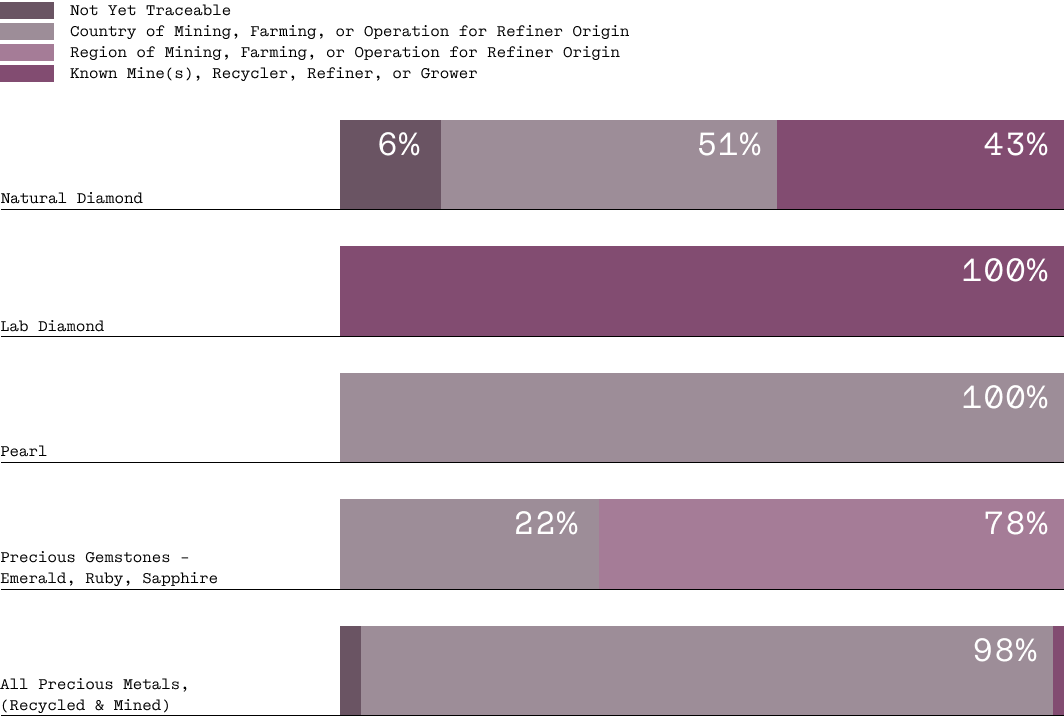
PHILANTHROPY
Empowering Women & Underrepresented Communities
We will support underrepresented individuals through education, upskilling, and advocacy, driven by collaborations, scholarships, partnerships, and donations.
Why it matters: Mejuri has redefined fine jewelry as everyday luxury while championing positive community and industry impacts. Supporting women and underrepresented groups aligns with our values, empowering them to shape their future. Through scholarships, bursaries, and grants, we extend our impact, fostering transformative change in the jewelry industry and beyond.
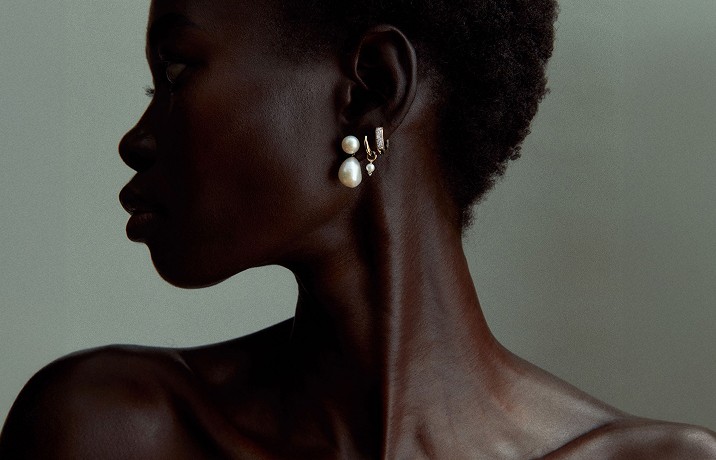
Methodology
- •
USD donated to causes and organizations that positively impact women and underrepresented communities
- •
Number of women receiving scholarships, bursaries, or grants
- •
Number of nonbinary people receiving scholarships, bursaries, or grants
October 2025 Update
Crossing the US $1 million philanthropy mark in 2024 was significant for a young company like Mejuri, but we're not done yet.
In 2025 we continue to build upon our impact through consistent partnership and programming.
- •
Through Indspire: 84 scholarships (2020-present)
- •
Through Design Thinking Africa: 26 scholarships PTD (2023 to 2024)
- •
Through UNCF: 39 scholarships PTD (2020 to 2024)
Total - 149 scholarships
As part of our expanded philanthropic efforts in 2024, we launched the Mejuri Design Excellence Award—supporting emerging talent in jewelry design and craft. Through partnerships with art schools in Canada, the U.S., and the U.K., we’re providing scholarships and bursaries to students pursuing careers in the field. We are continuing this program for 2025 through the same schools:
- •
California College of the Arts (USA)
- •
Central Saint Martins (UK)
- •
George Brown College (Canada)
- •
Rhode Island School of Design (USA)
- •
Savannah College of Art & Design (USA)
- •
Ontario College of Art & Design University (Canada)
- •
Vancouver Community College (Canada)


